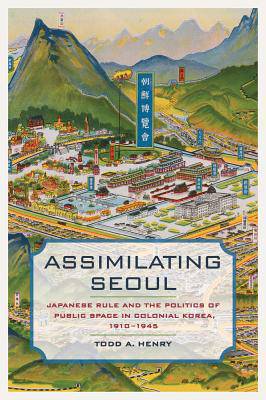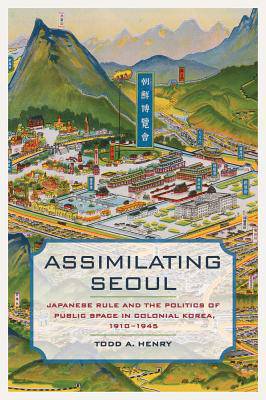
- Afhalen na 1 uur in een winkel met voorraad
- Gratis thuislevering in België vanaf € 30
- Ruim aanbod met 7 miljoen producten
- Afhalen na 1 uur in een winkel met voorraad
- Gratis thuislevering in België vanaf € 30
- Ruim aanbod met 7 miljoen producten
Zoeken
Assimilating Seoul
Japanese Rule and the Politics of Public Space in Colonial Korea, 1910-1945 Volume 12
Todd a Henry
€ 59,45
+ 118 punten
Uitvoering
Omschrijving
Assimilating Seoul, the first book-length study written in English about Seoul during the colonial period, challenges conventional nationalist paradigms by revealing the intersection of Korean and Japanese history in this important capital. Through microhistories of Shinto festivals, industrial expositions, and sanitation campaigns, Todd A. Henry offers a transnational account that treats the city's public spaces as "contact zones," showing how residents negotiated pressures to become loyal, industrious, and hygienic subjects of the Japanese empire. Unlike previous, top-down analyses, this ethnographic history investigates modalities of Japanese rule as experienced from below. Although the colonial state set ambitious goals for the integration of Koreans, Japanese settler elites and lower-class expatriates shaped the speed and direction of assimilation by bending government initiatives to their own interests and identities. Meanwhile, Korean men and women of different classes and generations rearticulated the terms and degree of their incorporation into a multiethnic polity. Assimilating Seoul captures these fascinating responses to an empire that used the lure of empowerment to disguise the reality of alienation.
Specificaties
Betrokkenen
- Auteur(s):
- Uitgeverij:
Inhoud
- Aantal bladzijden:
- 320
- Taal:
- Engels
- Reeks:
- Reeksnummer:
- nr. 12
Eigenschappen
- Productcode (EAN):
- 9780520293151
- Verschijningsdatum:
- 13/10/2016
- Uitvoering:
- Paperback
- Formaat:
- Trade paperback (VS)
- Afmetingen:
- 152 mm x 229 mm
- Gewicht:
- 471 g

Alleen bij Standaard Boekhandel
+ 118 punten op je klantenkaart van Standaard Boekhandel
Beoordelingen
We publiceren alleen reviews die voldoen aan de voorwaarden voor reviews. Bekijk onze voorwaarden voor reviews.











